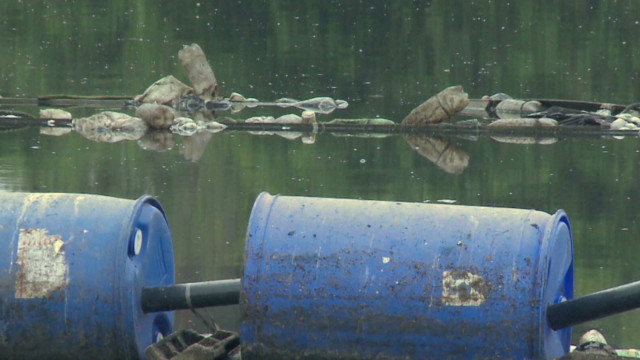Rio de Janeiro’s bid for the Olympics included tackling a historic environmental hazard: the pollution of Rio’s waterways. But with less than a month to go, the clean-up will be an unfulfilled promise.
CCTV America’s Lucrecia Franco has the story. Follow Lucrecia C. Franco on Twitter @LucreciaFranco

From the distance Rio de Janeiro, with its famous Guanabara Bay and Sugar Loaf Mountain as a backdrop, is considered one of the most beautiful places on earth.
But a closer look at the Olympic city’s waterways reveals a grim reality — floating debris and raw sewage that the so-called “Marvelous City” would rather hide.
Mario Moscatelli, a biologist who has been monitoring the pollution for 20 years, hoped the Olympic Summer Games would force Rio to clean-up its waters.
He has been taking members of the press or rides in his small boat on lagoons that surround the brand new Olympic Park, hoping to embarrass officials into taking action.
“All you see here are environmental crimes that are committed daily not only here in the lagoons, but in the Guanabara Bay, everywhere,” Moscatelli said.
He shows the source of the problem: raw sewage flowing from favelas, or slums, which he said is just one example of what happens in this part of the city.
The result is a mix of mud and human waste that releases gases such as sulfur and methane, exposure to which can be harmful.
“It can cause respiratory tract problems, irritate your eyes, cause severe headaches, dizziness and vomiting,” Moscatelli said.
When Rio won the bid to host the games back in 2009, authorities promised to clean 80 percent of the city’s waters. Then they scaled it back to 50 percent and now that goal is out of reach.
Guanabara Bay, the venue for the sailing events, is so polluted that Rio’s environment secretary recently admitted that cleaning it will not happen anytime soon.
“Whoever says, knowing the difficult financial situation of Brazil, that the bay will be cleaned up in less 20, 25 years is telling lies. It’s a lie,” Andre Correa, state environment secretary, said.
Barriers have been installed to keep trash off the course for Olympic sailors, but Moscatelli suggests other precautions.
“Vaccine athletes against Hepatitis A and avoid swallowing water — avoid having close contact with water,” Moscatelli said.
Moscatelli, the most vocal critic of Rio’s water pollution, hopes it won’t take sick Olympic rowers and sailors to get Brazil to fix the problem.
 CGTN America
CGTN America
